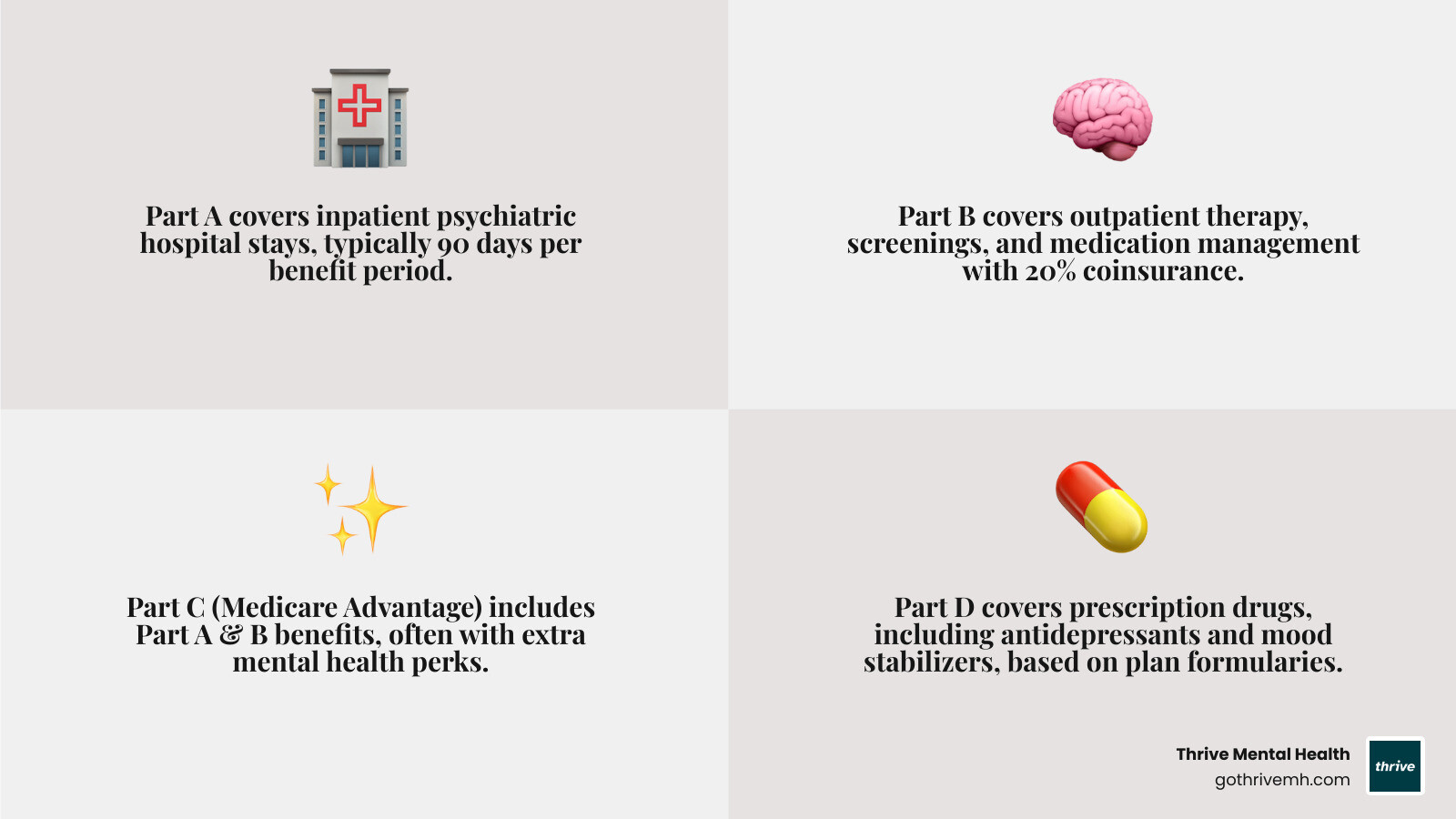Beyond the Blues: What Medicare Covers for Mental Health

Medicare Mental Health Coverage: Essential 2024 Guide
Why Understanding Medicare Mental Health Coverage Can Save You Thousands
If you or someone you know is in crisis, call or text 988 or chat 988lifeline.org. Call 911 if you’re in immediate medical crisis. You are not alone.
Medicare mental health coverage offers comprehensive benefits for therapy, medication, and specialized programs, but many beneficiaries are unaware of what’s included and what they’ll pay out-of-pocket.
Quick Answer: What Does Medicare Cover for Mental Health?
- Part A: Inpatient psychiatric care in hospitals (90 days per benefit period).
- Part B: Outpatient therapy, screenings, and medication management (20% coinsurance after deductible).
- Part D: Prescription drugs like antidepressants and mood stabilizers.
- Covered Services: Individual/group therapy, psychiatric evaluations, intensive outpatient programs (IOP), and partial hospitalization (PHP).
- Annual Costs: Part B deductible ($240 in 2024) plus 20% of Medicare-approved amounts.
The reality is stark: 1 in 4 Medicare beneficiaries live with a mental health condition, yet many struggle with complex coverage rules. With nearly 80% of older adults managing at least one chronic condition that can trigger anxiety or depression, understanding your mental health benefits is essential.
Medicare covers far more than most people realize, from late-life depression to intensive support through programs like IOP or PHP. The challenge is knowing what’s included, which providers accept Medicare, and how to avoid unexpected bills.
I’m Anna Green, LMHC, LPC, Chief Clinical Officer at Thrive Mental Health. I’ve helped thousands of patients steer insurance for intensive mental health programs. My experience has shown me that understanding your coverage is the key to accessing the care you need.

The Foundation: How Medicare Structures Mental Health Benefits
Understanding how the different parts of Medicare work together helps you access the full range of care without surprises. You’re typically eligible for Medicare at 65, but may qualify earlier with certain disabilities or conditions like ESRD or ALS.
Medicare Part A: Inpatient Hospital Care
Medicare Part A is your hospital insurance for when you need to be admitted for mental health treatment, either in a general hospital’s psychiatric unit or a specialized psychiatric facility.
- What’s Covered: Part A covers your semi-private room, meals, nursing care, and medications administered during your stay.
- Benefit Periods: Coverage is structured in 90-day benefit periods. A new period starts after you’ve been out of the hospital for 60 consecutive days.
- Lifetime Limit: There’s a 190-day lifetime limit for care in a freestanding psychiatric hospital, but this limit does not apply to psychiatric units within general hospitals.
- 2024 Costs: You’ll pay a $1,632 deductible per benefit period. Days 1-60 are fully covered after the deductible. For days 61-90, your daily coinsurance is $408, and for lifetime reserve days, it’s $816 each.
For a deeper dive on finding local care in Florida, check out our Comprehensive Guide to Local Mental Health Facilities and Inpatient Care.
Medicare Part B: Outpatient Services and Therapy
Medicare Part B is your medical insurance for most day-to-day mental health care, including therapy, psychiatric visits, and medication management.
Part B offers flexibility, allowing you to see providers like psychiatrists, psychologists, and clinical social workers without a referral under Original Medicare. It covers individual, group, and family counseling (when it supports your treatment). It also includes valuable preventive services like a free annual depression screening. A major benefit is the expanded telehealth coverage, letting you access care from your home in Florida. Explore our virtual therapy services to see how it works.
Your Part B costs for 2024 include a $240 annual deductible, after which you pay 20% of the Medicare-approved amount for most services.
| Feature | Medicare Part A (Hospital Insurance) | Medicare Part B (Medical Insurance) |
|---|---|---|
| Type of Care | Inpatient mental health care | Outpatient mental health care |
| Where You Get Care | General hospital, psychiatric hospital | Doctor’s office, clinic, hospital outpatient |
| What’s Covered | Room, meals, nursing, in-hospital medications | Therapy, evaluations, screenings, medication management |
| 2024 Deductible | $1,632 per benefit period | $240 annually |
| Your Share | Days 1-60: $0 (after deductible) Days 61-90: $408/day Lifetime Reserve: $816/day |
20% of Medicare-approved amount (after deductible) |
| Special Limits | 190 days lifetime in psychiatric hospitals | No specific lifetime limit |
Medicare Part D: Prescription Drug Coverage
Original Medicare does not cover most outpatient prescriptions. Medicare Part D fills this gap, covering mental health medications like antidepressants, mood stabilizers, and antipsychotics.
Each Part D plan has a “formulary,” or list of covered drugs. You can get this coverage through a stand-alone Prescription Drug Plan (PDP) or as part of a Medicare Advantage plan. Always check the formulary to ensure your medications are included before enrolling.
If you have limited income, the “Extra Help” program can significantly reduce your prescription costs. We also offer support through our medication management services to help Florida residents stay on track.
Your Complete Guide to Medicare Mental Health Coverage for Outpatient Care
Medicare Part B is your toolkit for outpatient mental health, covering everything from preventive screenings to intensive therapy. Understanding what’s available can help you get the support you need.
Preventive Screenings and Assessments
Medicare mental health coverage emphasizes early detection with several key screenings, often at no cost to you.
- ‘Welcome to Medicare’ & Annual ‘Wellness’ Visits: Your initial visit includes a review of depression risk factors. Each year after, your wellness visit includes a cognitive assessment to check for memory issues and discuss your mental health.
- Depression Screening: You get one free depression screening per year, a valuable tool for early detection and better outcomes.
- Alcohol Misuse Screening: Medicare covers this screening annually. If needed, you may qualify for up to four brief counseling sessions per year.
Understanding your medicare mental health coverage for Therapy and Counseling
Part B provides access to professional therapy for conditions like depression, anxiety, and grief.
- Individual and Group Psychotherapy: One-on-one “talk therapy” and group sessions are covered. Medicare supports various approaches like CBT and DBT.
- Family Counseling: Covered if its primary purpose is to support your personal treatment plan.
- Psychiatric Evaluations: These initial assessments are covered to help create an effective treatment plan.
- Telehealth and Virtual Therapy: Access therapy from home in Florida, a crucial option for consistent care, especially for those with mobility challenges. Learn more about virtual therapy options.
Medication Management and Other Part B Services
Part B also covers services that support a comprehensive treatment plan.
- Medication Management: Regular appointments to monitor your medications’ effectiveness and manage side effects are covered.
- Certain Injectable Drugs: Drugs that aren’t self-administered and are given in a doctor’s office are often covered.
- Digital Mental Health Tools: Medicare now covers some FDA-cleared digital therapy devices prescribed by your doctor.
- Crisis Support: Services like safety planning interventions for suicide risk and follow-up calls after a crisis discharge are covered to provide proactive support.
For more details on medication support available to Florida residents, visit our guide on medication management.
Coverage for Higher Levels of Care: IOP, PHP, and Substance Use Treatment
When weekly therapy isn’t enough, medicare mental health coverage includes intensive programs and substance use disorder (SUD) treatment. These programs bridge the gap between outpatient care and full hospitalization.
Intensive Outpatient (IOP) and Partial Hospitalization (PHP)
IOP and PHP offer structured support while allowing you to live at home. They are ideal when you need more than regular therapy but don’t require 24/7 inpatient care.
- Intensive Outpatient Programs (IOPs): Covered by Medicare Part B, IOPs provide at least 9 hours of therapeutic services per week. This includes structured group therapy, individual counseling, and medication management. It’s designed to fit around your daily life.
- Partial Hospitalization Programs (PHPs): A step up from IOP, PHPs require a minimum of 20 hours of active treatment per week. Covered by Part B, these programs offer a comprehensive daily schedule of psychotherapy, occupational therapy, and patient education.
Thrive Mental Health offers flexible virtual and hybrid IOP/PHP options to residents in Florida, including evening programs. To see which is right for you, Learn the difference between PHP vs. IOP.
Inpatient and Outpatient Substance Use Disorder (SUD) Treatment
Medicare provides comprehensive treatment for SUD, recognizing the strong link between substance use and mental health.
- Inpatient Detox: Medicare Part A covers medically supervised withdrawal in a hospital setting, which is critical for safe detox from substances like alcohol.
- Outpatient SUD Counseling: Part B covers individual and group therapy for substance use.
- Opioid Treatment Programs (OTPs): Medicare covers certified OTPs, which offer a bundled approach including medication-assisted treatment (MAT), counseling, and drug testing.
- Alcohol Misuse Support: Part B covers annual alcohol misuse screenings and, if needed, up to four brief counseling sessions per year.
Addressing mental health and substance use together often leads to better outcomes. For help finding local providers in Florida, you can find state-licensed treatment options via SAMHSA.
The Bottom Line: Costs, Providers, and What Isn’t Covered
Understanding your financial responsibility and who can provide care is crucial for getting the most out of your medicare mental health coverage.
Costs associated with medicare mental health coverage
Even with good coverage, you’ll have some out-of-pocket costs. Here’s what to expect for outpatient services under Part B:

- Part B Deductible: For 2024, you must meet a $240 annual deductible.
- 20% Coinsurance: After your deductible, you pay 20% of the Medicare-approved amount for most services.
- Copayments: Hospital outpatient programs like PHP or IOP may have an additional facility copayment.
- “Accepting Assignment”: To save money, choose providers who “accept assignment.” This means they accept the Medicare-approved amount as full payment, and you only owe your deductible and coinsurance. Providers who don’t can charge you more.
Exploring Affordable Health Plans in Florida can sometimes help supplement Medicare and reduce expenses.
Who Can Provide Your Care?
Medicare covers services from a wide range of qualified professionals, giving you options to find the right fit. Approved providers include:
- Psychiatrists
- Clinical psychologists
- Clinical social workers (LCSW)
- Nurse practitioners (NP) and clinical nurse specialists (CNS)
- Marriage and family therapists (MFTs) and mental health counselors (MHCs) (as of 2024)
Always verify that your provider is licensed, accepts Medicare, and is in-network if you have a Medicare Advantage plan.
Medicare Advantage (Part C) and Exclusions
Medicare Advantage (Part C) plans are an alternative to Original Medicare. These private plans must cover everything Original Medicare does but often include extra benefits like dental, vision, or expanded telehealth services.
However, they usually have provider networks, so you must ensure your preferred mental health professional is in-network to avoid high costs. In Florida, where Thrive Mental Health operates, you can find various Advantage plans from insurers like Cigna and UnitedHealthcare.
What Medicare generally doesn’t cover:
- Pastoral counseling (unless the provider is also a licensed therapist)
- Non-clinical support groups
- Transportation (though some Advantage plans may offer it)
- Private duty nursing or comfort items in a hospital
- Experimental treatments
Services must be medically necessary and delivered by a qualified provider to be covered. For more details, Medicare.org provides a helpful overview.
Frequently Asked Questions about Medicare Mental Health Coverage
Here are concise answers to common questions about your medicare mental health coverage.
How many therapy sessions does Medicare cover per year?
Original Medicare does not set a limit on the number of therapy sessions you can receive per year. As long as your provider certifies that the services are medically necessary for your condition, coverage can continue. However, Medicare Advantage (Part C) plans may have their own annual limits, so it’s crucial to check your specific plan’s details.
Does Medicare cover therapy for anxiety and depression?
Yes. Medicare Part B covers outpatient therapy for mental health conditions like anxiety, depression, PTSD, and bipolar disorder. This includes individual and group psychotherapy, as well as psychiatric evaluations, as long as the services are deemed medically necessary by a Medicare-approved provider.
Do I need a referral to see a psychiatrist with Medicare?
With Original Medicare, you generally do not need a referral to see a psychiatrist or other mental health professional. However, if you have a Medicare Advantage plan (especially an HMO), you will likely need a referral from your primary care physician. Always confirm your plan’s specific rules before scheduling an appointment.
Take the Next Step in Your Mental Health Journey
Understanding medicare mental health coverage can feel complex, but now you know that Medicare covers far more mental health services than most people realize. Your benefits are there to help, whether you need ongoing therapy, medication management, or intensive support through programs like IOP or PHP.
The key is to use these benefits effectively. Original Medicare offers flexibility without referrals for most specialists, and telehealth has made care more accessible than ever. If you choose a Medicare Advantage plan, just confirm your providers are in-network.
Don’t let insurance confusion stop you from getting help. Your mental health is just as important as your physical health. Taking that first step is often the hardest part, but your Medicare coverage provides a strong foundation for your mental wellness journey.
Ready for support in Florida? Thrive Mental Health offers virtual and hybrid IOP/PHP with evening options. Verify your insurance in 2 minutes (no obligation) → or call 561-203-6085. If you’re in crisis, call/text 988.
